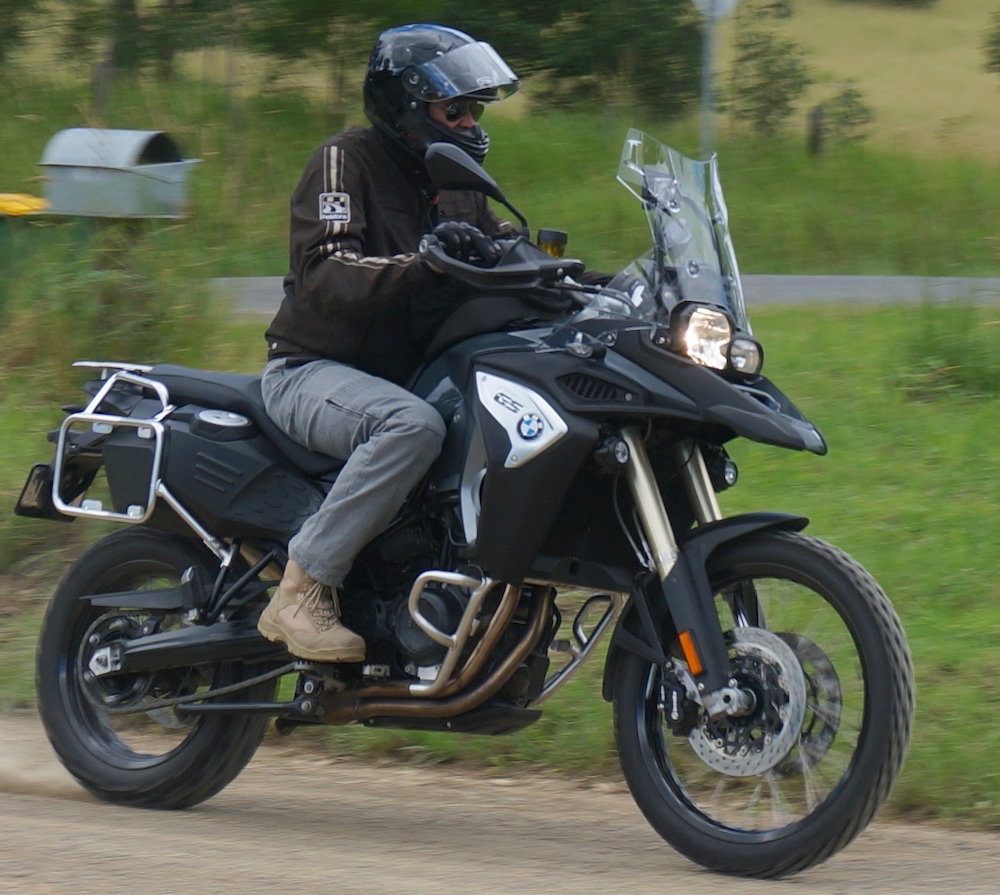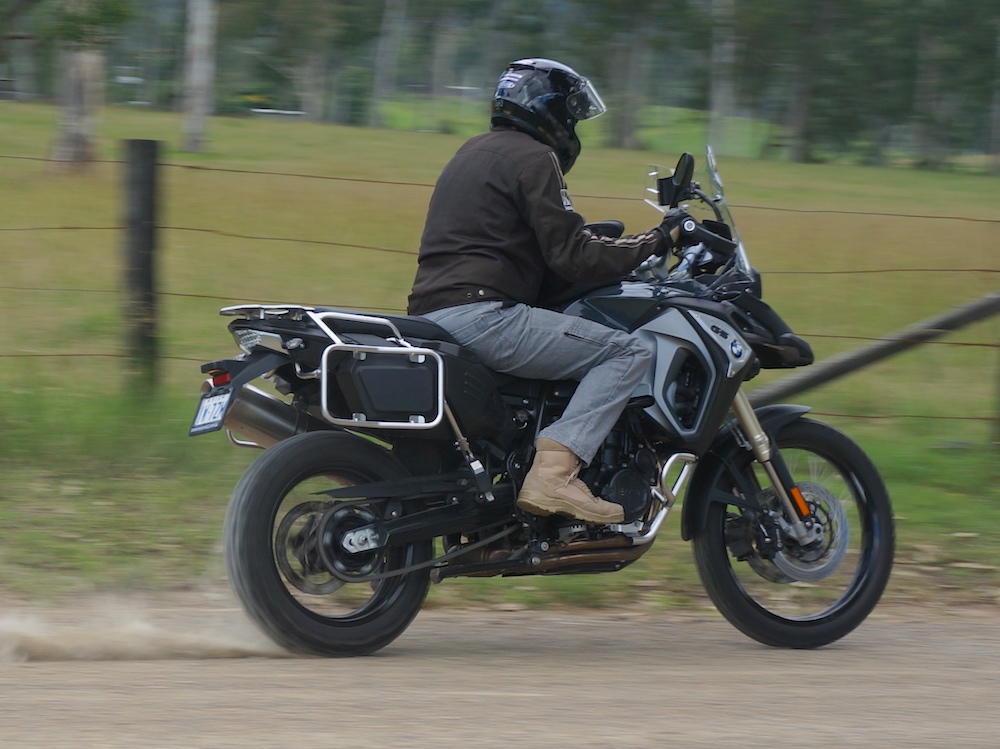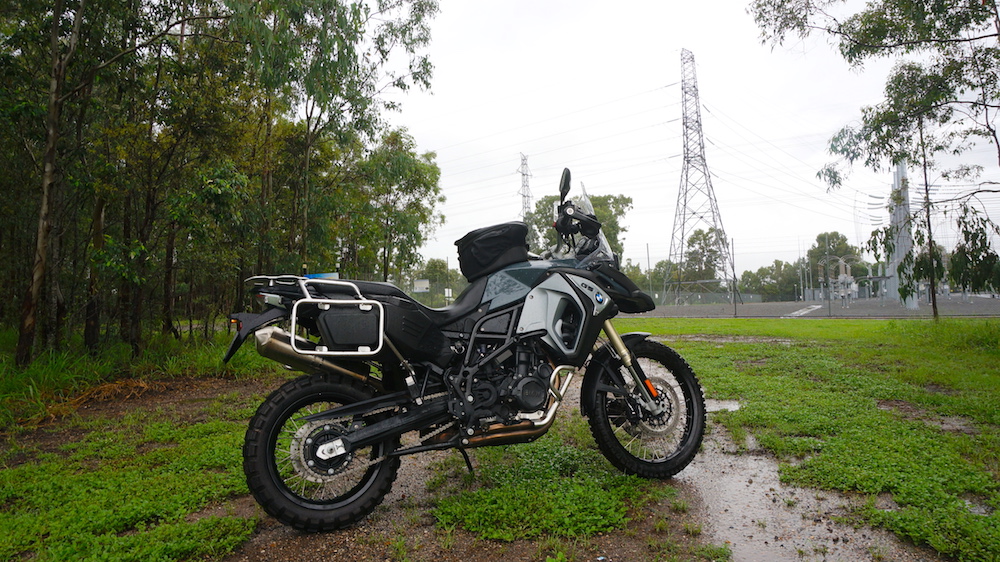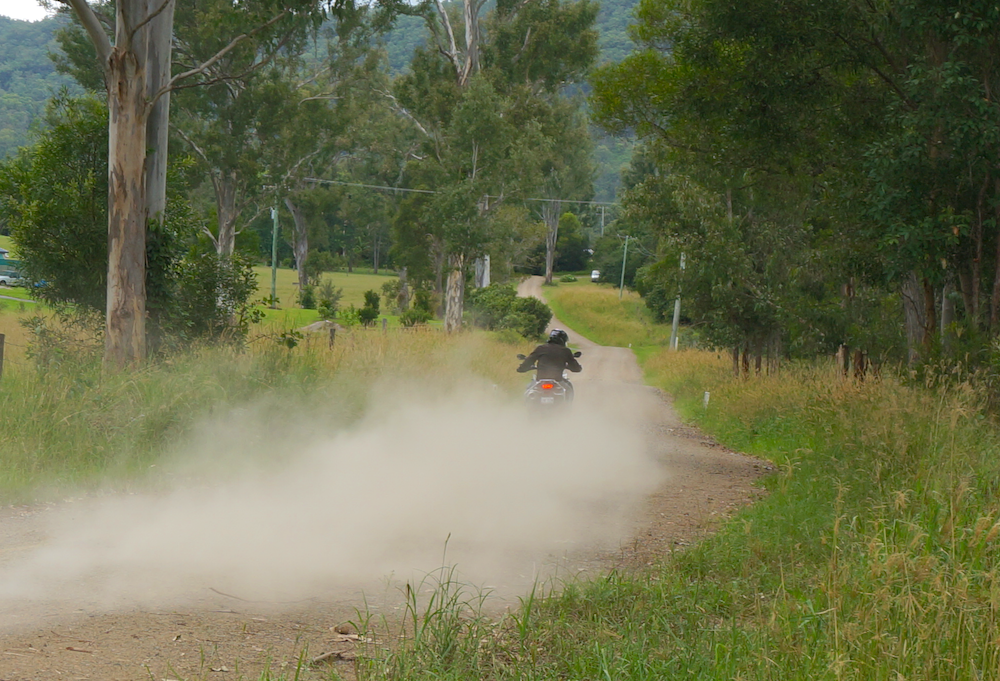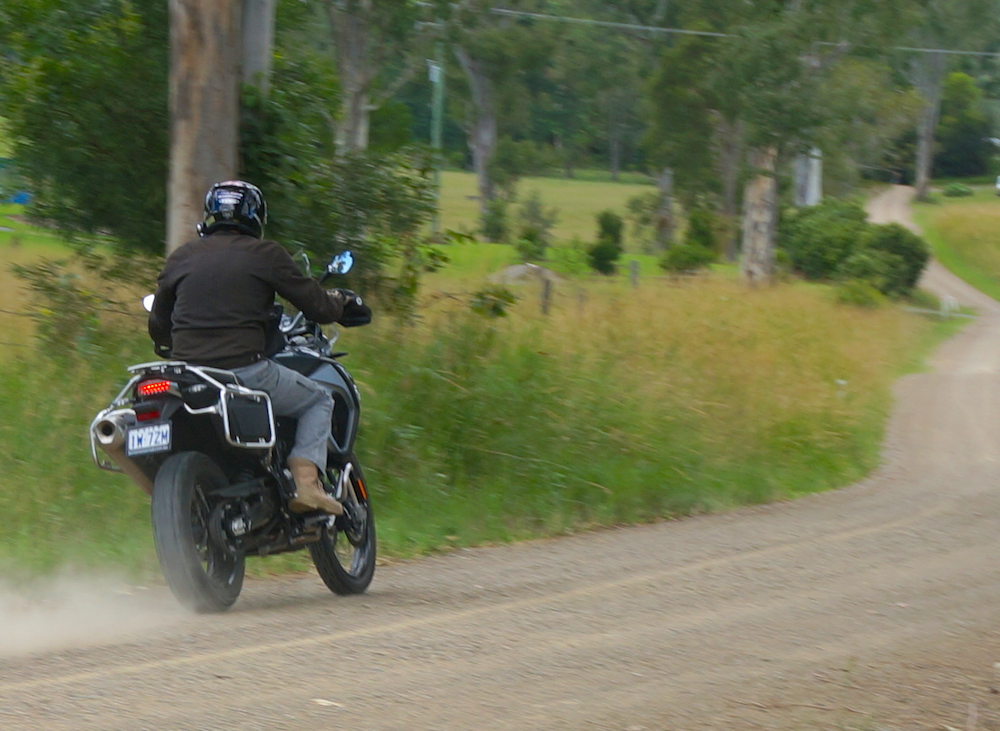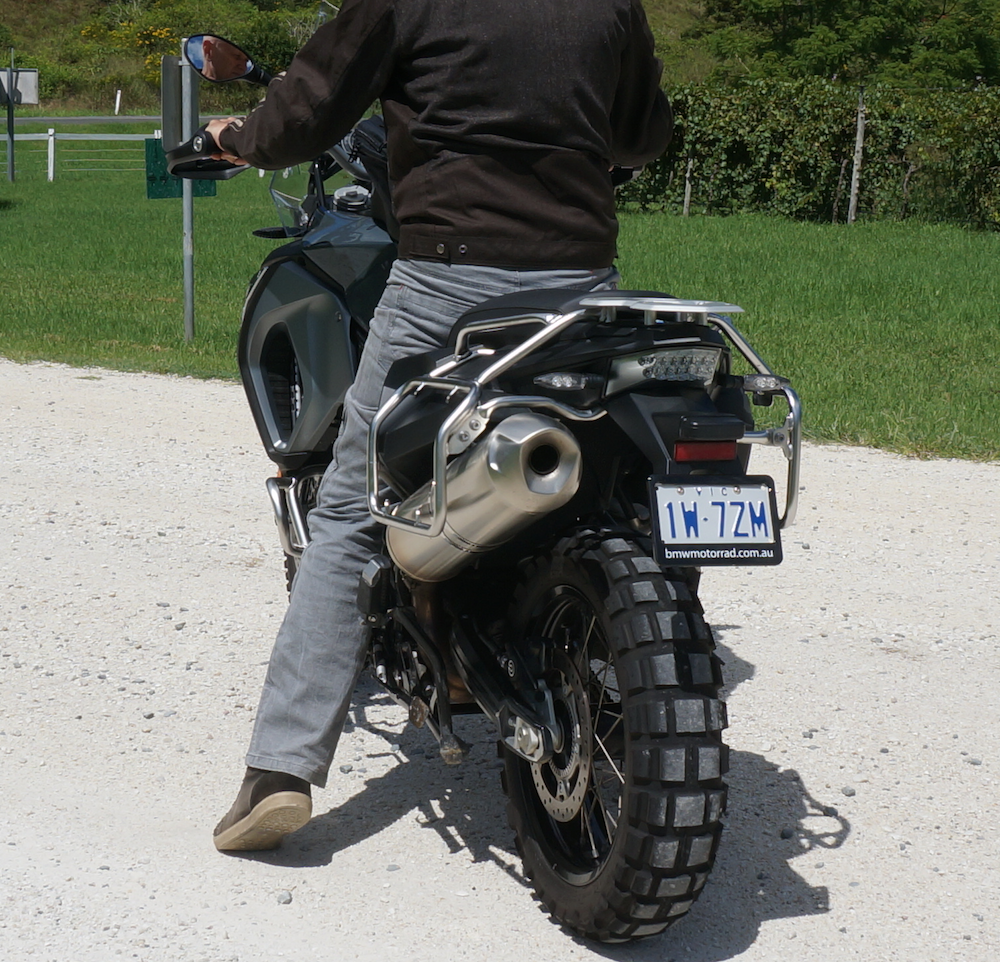If we were really practical about our motorcycle choice, we would probably all be riding the BMW F 800 GS Adventure.
With its big 24-litre tank and go-anywhere capabilities, it is the ideal bike for Australia’s vast distances and rough roads and tracks. Yet it is also refined enough to be a canyon carver and weekday commuter.
At $21,500 you can ride away with one of the most practical and versatile bikes in the world. Actually, you can get a 2017-model bike built in 2016 for just $17,990 ride away if you are quick!
Next-gen F models
They are no doubt trying to clear all models before the rumoured 850cc or 900cc version arrives later this year to compete against the popular Honda Africa Twin.
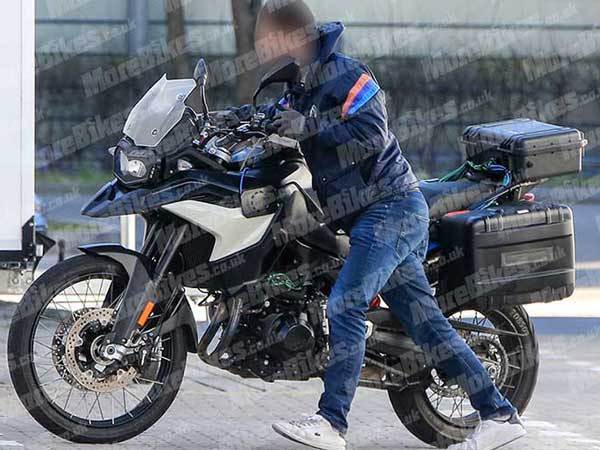
This spy photo from MoreBikes.co.uk shows it now has a conventional fuel tank, tubeless tyres, chain and exhaust swapped around, and LED headlights.
Our test bike
When I picked up the test bike from Motorline BMW at Springwood, Brisbane, the skies were blue and the roads were inviting!
But over the next week, the weather became deadly as Tropical Cyclone Debbie wreaked havoc across two states.
Yet the bold BMW met all challenges the terrain and weather could throw at it.
At first I headed for the hills to get myself used to the tall bike with its big front hoop.
I owned one of the first generation F 800 GS models and loved it. So it didn’t take long to get back into the feel of manhandling the F 800 GS Adventure into corners
Over Mt Tamborine a sportsbike loomed up behind me and I waved him through as we approached the twisting Goat Track. He shook his head and I knew “it’s on!” So I selected the sport setting on the electronic suspension adjustment and set off.
The test bike was shod with Continental TKC80 knobby tyres which had already done the last GS Safari, so they were not only inappropriate for these conditions, but also on the worn side.
My old F 800 GS had none of the electronic chicanery that the new models have, but I was glad of the ABS and traction control as I pushed to stay in front of the sportsbike rider.
On several occasions, the tyres squirmed, slid and wobbled as I braked hard into corners, leaned deeply and throttled hard out of the apex.
However, the electronics saved my bacon each time without any alarming or jerky feedback.
BMW really has the electronic rider aids well sorted these days.
At the end of the Goat Track, the sportsbike rider pulled up beside me and gave me a nod of appreciation. Job well done!
Clean and green
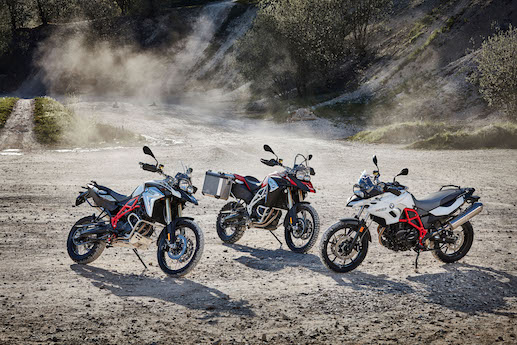
For 2017 the F 700 and F 800 GS range have cleaner engines to meet the tough new Euro 4 emissions, without any reduction in power or torque.
The bikes now come with an “electromotive throttle controller” that delivers a signal from a sensor on the throttle to the engine control system and the throttle valves.
This allows the expansion of the engine modes to Rain, Road, Enduro and Enduro Pro that control throttle response, ABS activation and traction control.
Rain and Road are standard on all models and Enduro and Enduro Pro are optional on the F 800 GS and GSA.
More importantly, it now has one of the smoothest throttles of any bike.
There is no jerk from idle which is a huge help when you are at the limits in a tight hairpin on the Goat Track!
The smooth fuelling also helps when you are caught in a tricky single-track situation and need precise throttle or when lane filtering through commuter traffic.
By the way, lane filtering is easy as the bike is slim, even though it has a fat bum with its underseat tank and wide bars. Those bars are so high they go over most car wing mirrors, but be aware of mirrors on pick-up trucks and SUVs.
Cyclone Debbie
The third day of my test, Debbie descended on Brisbane and unleashed a waterfall of rain.
So I put on my Draggin Hydro suit, selected the “Rain” mode on the F 800 GS Adventure and headed out into the maelstrom.
That precise and smooth fuelling, together with the traction control, ABS and Rain mode made riding on slippery roads very confidence inspiring, even with knobby tyres.
There was no occasion when I felt the bike was out of my control.
The deluge was short-lived, but the consequences stayed around for days, so I headed away from where the emergency services were active and ventured into the hills.
Even here there were dangers in the gravel and vegetation that had washed across the roads.
So I kept all the electronic controls in place.
Dirty work
I also found some crushed granite roads and trails to ride that were not rutted and gouged by the rains.
As much of the electronic aids were switched off as possible, but I ended up switching them all back on again. They work so well and adjust to the conditions, depending on the modes you select.
I also hooked up with a friend on an MV Agusta, so I again adjusted the suspension to the sport setting and did my best to hang on to his tail.
The F 800 GS Adventure even got in front of the MV on the rougher sections after I switched to the “comfort” suspension setting.
This is simply the most versatile and practical bike for every occasion. The only limiting factor here was the tyre choice.
Handsome F 800 GS Adventure
At a lunch stop, I noticed a guy looking at our parked bikes. I thought he was admiring my friend’s sexy MV parked next to the BMW, but he was actually interested in the F 800 GS Adventure.
“Looks nice,” he said.
That’s weird because I never considered any of the GS models to “look nice” (except the gorgeous R nineT Urban/GS). Maybe handsome in a rugged Micky Rourke sort of way, but certainly not nice.
However, I do love the milky grey paint which is nicely reflected in the new instruments.
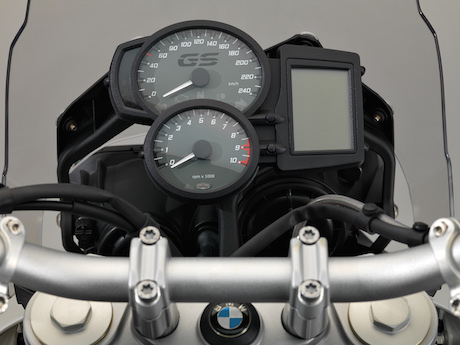
For 2017, BMW has added a few cosmetic garnishes, such as a new galvanised radiator trim and integrated GS emblem, a redesigned airbag cover and ignition lock and added a GS emblem to the windshield.
A couple of gripes
The only gripes I have about the F 800 GS Adventure are the heat from the engine and the low gearing.
My old F 800 GS poured a fair bit of heat on to my right thigh. A later model had a plastic shield inserted to stop this.
Now the bike spews even hotter air on to the lower legs and feet. If you wear high boots, it would be no problem, but I wore short airflow boots and it was uncomfortably hot, especially in slow trail and traffic conditions.
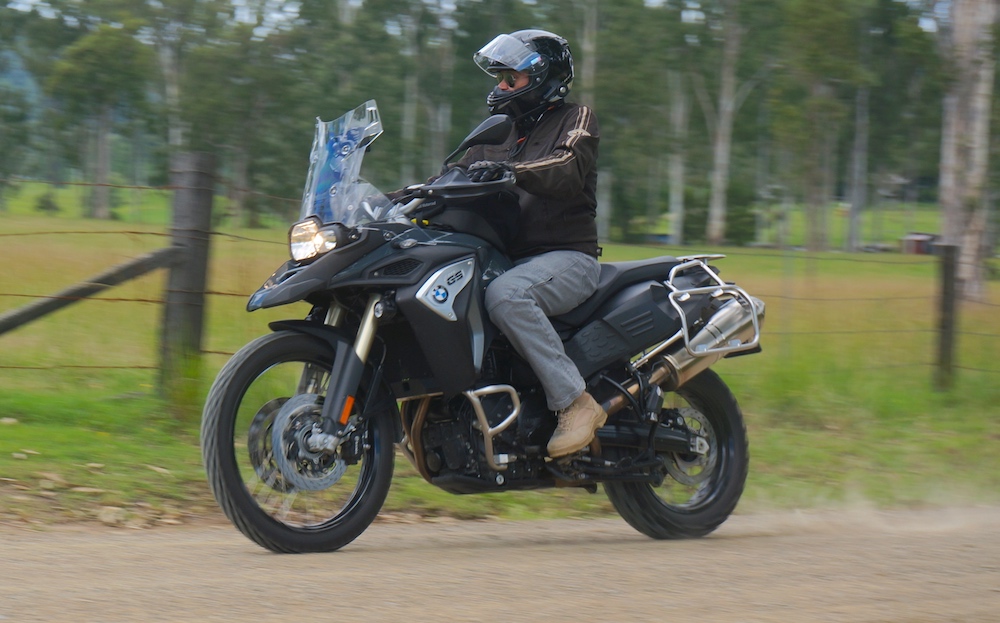
It certainly helps fuel economy which was 3.9L/100km for my test which included some very hard accelerating. That’s ample range of up to 600km from a single tank!
As for the gearing, it is great for trail and traffic, but too low for highway riding.
At 100km/h in sixth gear it is buzzing at 4000 revs. In fact, that buzzing continues right throughout the rev range.
I’m not sure why as my old F 800 GS did not buzz like this, it also had TKC80 tyres and the gear ratios are exactly the same.
While it’s great on dirt roads, on the highway I was constantly reaching for that elusive seventh gear.
Verdict
The BMW F 800 GS Adventure really will take you anywhere you want to go with very few compromises, tyre choice aside.
However, only tall people should apply. I’m 185cm tall and I can’t get my feet flat down on the ground in the 890mm seat. You can get an optional 860mm seat, but that’s still very high.
BMW F 800 GS Adventure |
|
| Price | $21,500 (ride away) – $17,990 (ride away for a 2017 model built in 2016) |
|---|---|
| Engine | Water-cooled 4-stroke in-line two-cylinder engine, four valves per cylinder, two overhead camshafts, dry sump lubrication |
| Bore x stroke | 82mm x 75.6mm |
| Capacity | 798cc |
| Rated output | 63kW (85hp) at 7500rpm |
| Max. torque | 83Nm at 5750rpm |
| Compression ratio | 12.0 : 1 |
| Mixture control / engine management | Electronic intake pipe injection |
| Emission control | Closed-loop 3-way catalytic converter / emission standard EU-3 |
| Performance / fuel consumption | |
| Maximum speed | 193km/h |
| Fuel consumption per 100 km at constant 90km/h | 4.3 l |
| Fuel consumption per 100 km at constant 120km/h | 5.7 l |
| Fuel type | Unleaded super, minimum octane rating 95 (RON); |
| Electrical system | |
| Alternator | three-phase alternator 400 W (rated power) |
| Battery | 12 V / 14 Ah, maintenance-free |
| Power transmission | |
| Clutch | Multiple-disc clutch in oil bath, mechanically operated |
| Gearbox | Constant mesh 6-speed gearbox integrated into crankcase |
| Drive | Endless O-ring chain with shock damping in rear wheel hub |
| Chassis / brakes | |
| Frame | Tubular steel space frame, load-bearing engine |
| Front wheel location / suspension | Upside-down telescopic fork, Ø 43mm |
| Rear wheel location / suspension | Cast aluminium dual swing arm, WAD strut (travel related damping), spring pre-load hydraulically adjustable, rebound damping adjustable |
| Suspension travel front / rear | 230mm / 215mm |
| Wheelbase | 1,578mm |
| Castor | 117mm |
| Steering head angle | 64° |
| Wheels | Wire spoke wheels |
| Rim, front | 2.15 x 21″ |
| Rim, rear | 4.25 x 17″ |
| Tyres, front | 90/90 – 21 54V |
| Tyres, rear | 150/70 – 17 69V |
| Brake, front | Dual disc, floating brake discs, diameter 300 mm, double-piston floating calipers |
| Brake, rear | Single disc, diameter 265 mm, single-piston floating caliper |
| ABS | BMW Motorrad ABS (disengageable) |
| Dimensions / weights | |
| Length | 2305mm |
| Width (incl. mirrors) | 925mm |
| Height (excl. mirrors) | 1450mm |
| Seat height, unladen weight | 890mm |
| Inner leg curve, unladen weight | 1960mm |
| Unladen weight, road ready, fully fuelled 1) | 232kg |
| Permitted total weight | 454kg |
| Payload (with standard equipment) | 222kg |
| Usable tank volume | 24l |
| Reserve | ca. 4,0 l |



